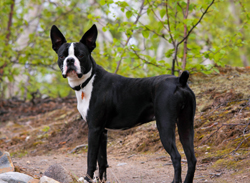Boston Terriers are highly intelligent, compactly built dogs. Their coats are black, brindle, or seal with white markings, and their coat is smooth and short. Their tails are short and their eyes are round, large, and dark in color. Their short, square muzzles do not wrinkle. Boston Terriers weigh 10 to 25 pounds and live up to 13 years.
Boston Terriers should be closely monitored when outside in the heat.
These dogs make great house pets are beloved for their easiness to train, gentle disposition, and intelligence. They get along with nearly everyone, including children and other pets, and they thrive in both apartments and large houses. They are also easy to groom and are affectionate with their human family members.
Boston Terriers are sometimes known by the nickname "the American Gentleman" due to their dapper appearance. Many people believe the Boston Terrier's coat looks like a little tuxedo.
Genetically, it seems like Boston Terriers ended up with the best traits from both their Bulldog and terrier ancestors. These dogs are lively and always seem to be in a good mood. They generally get along with everyone, including children, cats, dogs, and other Boston Terriers. However, they might lose patience with very young children.
These dogs can be spunky and moody, but they are generally amiable and easygoing. Boston Terriers are a playful breed and want to be included in everything, from watching television to family dinners to trips to the grocery store. Although they can, and sometimes do, entertain themselves, these dogs would much rather play with their family. They will find happiness anywhere, whether they live in an urban apartment, a suburban house, or on a rural farm.
Boston Terriers benefit from regular exercise, but they don't need much of it. A daily walk and some park time is more than enough for these little dogs. They prefer physical activities with their human family members to playtime by themselves.
Boston Terriers are at risk for a number of potentially serious health conditions, including allergies, heart problems, hydrocephalus, esophageal achalasia, patellar luxation, stenotic nares, distichiasis, and persistent right aortic arch. Because these dogs are flat-faced, brachycephalic dogs, they are at risk for life-threatening breathing difficulties that may require surgery or may be unrepairable. Their short snouts cause drooling, snoring, and snorting, and they are prone to heatstroke. Boston Terriers should be closely monitored when outside in the heat.
Eye conditions are the most reported health problem in the breed, with Boston Terriers developing cataracts, glaucoma, and corneal ulcers more than other breeds. Additionally, these dogs are prone to deafness. Because of this, they need routine hearing examinations throughout life. Undiagnosed deafness can negatively affect training, socialization, and bonding.
The breed's corkscrew tail is associated with hemivertebrae, which is a failure of the spine bones to develop. Some dogs with this condition may be asymptomatic, while others may end up paralyzed. Also, Boston Terriers are sensitive to anesthesia and prone to corneal abrasions. Additionally, there's a high rate of cesarean deliveries in this breed.
With routine veterinary care, prompt treatment of health problems, good nutrition, and regular exercise, Boston Terriers can live up to 13 years.
Boston Terriers are intelligent, easy to train, and eager to learn. They don't generally exhibit many behavioral problems, although the breed can still benefit from basic training and socialization. Most problems occur during the Boston Terrier's adolescence, which can start as soon as 6 months and last until the breed's second birthday or later.
These dogs make good watchdogs. They have a naturally protective nature, are wary of strangers, and will bark and bark if an unfamiliar person approaches their family or property. In some cases, barking can become excessive. Training can address this problem and teach the Boston Terrier when barking is and isn't appropriate.
This breed has a talent for learning tricks and does well competing in obedience, agility, and other dog sports. These activities can provide much needed mental stimulation and help stave off boredom. Boston Terriers are inside dogs. They are not physically fit to live outdoors in most climates.
Boston Terriers are not known for shedding excessively. A weekly brushing with a rubber hound mitt is generally enough to remove dead hair, keep loose hairs off furniture, and distribute skin oils to keep the skin and coat healthy.
Another good thing about these dogs is that they don't have much smell. This makes them a good fit for anyone sensitive to "doggy odor." It also means they don't need bathing more than a few times each year. If additional bathing is necessary to remove sticky or harmful substances, it's best to use a dog shampoo recommended by a veterinarian.
These dogs need their toenails trimmed every few weeks to prevent snags and tears, and their teeth should be brushed regularly to maintain dental health and freshen breath. Dogs resistant to having their teeth brushed may benefit from canine dental treats and dental water additives. These products are designed to protect the teeth and gums between brushings.
This breed was developed in the United States, in the stables of Boston, Massachusetts, from a cross between a white English Terrier and an English Bulldog. The first of these dogs was named Hooper's Judge.
Although Hooper's Judge was considerably larger than today's Boston Terrier, breeding with smaller and smaller females eventually produced a more compact dog that became the foundation for today's breed. Originally, not much attention was given to the breed's markings, but today this is an important feature.
Although these dogs were originally bred as fighting dogs, they quickly became beloved companion animals. During the early to middle 1900s, the Boston Terrier was one of the most popular breeds in America. Although their popularity has slightly declined since then, they remain very popular household pets.
The American Kennel Club officially recognized the Boston Terrier breed in 1893.

